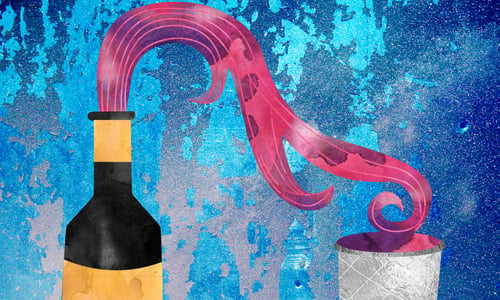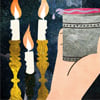First let’s talk a bit about kiddush. In the Ten Commandments, the Torah commands us to “remember (zachor) the Sabbath day to sanctify it.”1 This teaches us that we are to verbally declare the Shabbat holy, which we do when we make kiddush. The term zachor is associated with wine in numerous places in Scripture.2 Thus, the sages instituted that this mitzvah be done over wine. (This is also the reason for the havdalah wine.)3
The wine—which is a celebratory beverage—also serves to show that the meal we are about to eat isn’t just another regular meal, but a special, joyous and festive one. (This is the main reason for using wine at the daytime kiddush.)4
Additionally, the rabbis throughout the ages have offered further reasons why kiddush is recited specifically on wine.
Wine Brings Joy
Wine has a special power to gladden the hearts of men. And when it is used for a holy purpose, such as to celebrate Shabbat, it also “gladdens G‑d.”5
Wedding Celebration
The Zohar describes Shabbat as the “bride” of the Jewish people. Just as the betrothal of a bride (called kiddushin, “sanctification”) is recited over wine, so is kiddush recited over wine.
All blessings flow from the Torah, which is compared to wine. When we sanctify and bless this holy day, it is through the power of this “wine.” This is alluded to in the verse, “We will recall Your love more fragrant than wine [מיין]; they have loved You sincerely.”6 The Hebrew word for “more than wine” can also be translated as “from wine,” i.e., G‑d’s love flows from the power of wine—Torah.7
Rectifying the Forbidden Fruit
The sages tell us that Adam and Eve ate of the forbidden fruit late on Friday afternoon.8 Due to the honor of the Sabbath, they were granted a reprieve of judgement until after Shabbat.9
According to many opinions, the forbidden fruit was a grape.10 We rectify the sin when we make a blessing and use grape wine for a mitzvah around the same time that the sin took place. (Technically, one can accept Shabbat late Friday afternoon.)11
The Numerical Value
The Hebrew word for wine (יין) has the numerical value of 70 (10+10+50=70). There are 35 words12 in the verses that we chant before the kiddush,13 and another 35 words in the actual kiddush blessing. Put them together, and you get 70 (35+35=70).14
Now, if you take out your siddur and count, you may discover that there are 42 words in the kiddush blessing. Some people do not say the seven words that translate as “for You have chosen us and sanctified us from among all the nations.” Others, including Chabad, do say those words. So how do we get 35? By not counting the opening words Baruch atah . . . asher, since they are a general introduction to many blessings, and not unique to kiddush. Rather, the word count begins from the word kideshanu, where we begin to discuss the theme of kiddush: sanctification.15
The Wine of Moshiach
We celebrate the Sabbath as a testimony to G‑d having created the world in six days and “rested” on the seventh. At that time, He set aside special wine to be used at the celebratory meal when the Moshiach comes.16 Just as the six-day workweek culminates in Shabbat, so will the six millennia of our work to make the world a home for G‑d culminate in the messianic era—“the day that is wholly Shabbat and tranquility, for life everlasting.”17 May it be speedily in our days!







Join the Discussion